Mathea Ford's Blog, page 23
April 20, 2024
The Ultimate Guide: Best Fluids To Hydrate With Kidney Disease - Podcast

In the journey of managing chronic kidney disease, understanding the pivotal role of hydration becomes paramount. From safeguarding kidney health to enhancing overall well-being, proper hydration is a cornerstone. Join us as we delve into the intricate relationship between hydration and kidney function, unraveling essential insights and practical tips to empower you on your health journey.
Understanding Hydration and Kidney HealthFor More Recipes and Ideas --->> Get Your Free Meals and Recipes That Are Perfect for Pre-Dialysis Diets, Pre-Dialysis with Diabetes, or Dialysis Diets.
Hydration isn't just about quenching thirst; it's a vital component in maintaining kidney health. Chronic kidney disease accentuates the importance of managing fluid intake, as impaired kidneys struggle to eliminate excess fluids. Thus, striking a balance with kidney-safe fluids becomes imperative to prevent complications such as kidney stones and urinary tract infections.
Water constitutes a significant portion of our bodies, contributing to essential bodily functions beyond hydration alone. Insufficient water intake can lead to various negative effects, including dehydration symptoms like dark urine and fatigue. Understanding these signs and their impact on kidney function is crucial for maintaining optimal health.
Navigating hydration with kidney disease requires careful consideration of both beverages and foods. Opting for kidney-friendly fluids like herbal teas and incorporating hydrating fruits and vegetables into your diet can help ensure adequate hydration without overtaxing your kidneys. By making mindful choices, you can support kidney health while enjoying a diverse range of hydrating options.
Excessive soda consumption can pose risks to kidney health due to its high sugar and phosphorus content. Similarly, while coffee is not harmful in moderation, excessive intake may elevate potassium levels, potentially affecting kidney function. Exploring healthier alternatives like infused water and low-potassium fruit juices offers a safer approach to hydration for kidney patients.
In the later stages of kidney disease, fluid restriction becomes necessary to prevent complications like edema. Monitoring fluid intake through methods such as food diaries helps maintain optimal hydration levels while adhering to prescribed guidelines. By working closely with healthcare professionals, individuals can navigate fluid restrictions effectively, ensuring both kidney health and overall well-being.
Selecting hydrating options tailored to kidney health is essential for optimal well-being. From kidney-friendly beverages like herbal teas to hydrating fruits and vegetables such as watermelons and cucumbers, incorporating these choices into your diet supports both hydration and kidney function. By prioritizing hydration with suitable options, individuals can proactively manage their kidney health while enjoying a diverse and nourishing diet.
Our exploration of hydration and kidney health, it's evident that proper fluid management is integral to overall well-being, particularly for individuals with chronic kidney disease. By understanding the nuances of hydration, making informed choices, and seeking guidance from healthcare professionals, you can navigate your health journey with confidence. Remember, prioritizing hydration isn't just about quenching thirst—it's about nurturing your kidneys and safeguarding your long-term health.
The post The Ultimate Guide: Best Fluids To Hydrate With Kidney Disease - Podcast appeared first on Renal Diet HQ.
Suggested Reading:
What Is Chronic Kidney DiseaseDiabetic Renal Diet Meal PlanFluids To Hydrate With Kidney DiseaseApril 17, 2024
Myth vs Fact: Only the Elderly get Ckd-Podcast
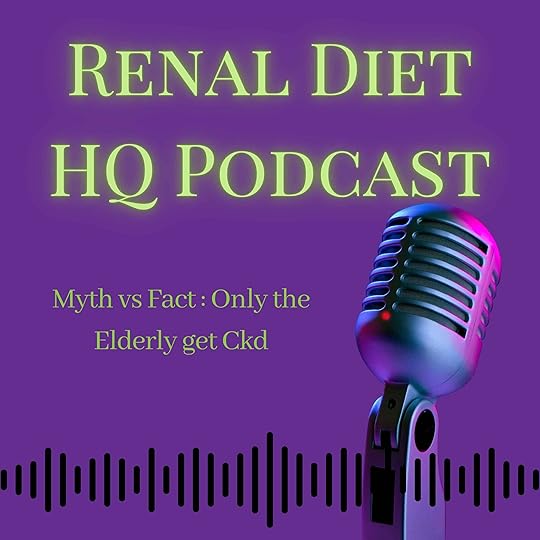
Hey there! Today, let's bust a common myth about chronic kidney disease or CKD. Many believe that CKD is a condition that only affects older adults but is that the complete picture? Let's find out.
Understanding CKDFor More Recipes and Ideas --->> Get Your Free Meals and Recipes That Are Perfect for Pre-Dialysis Diets, Pre-Dialysis with Diabetes, or Dialysis Diets.
CKD, where the kidneys gradually lose their function, is often associated with aging, and it's true that the risk increases as we get older. But here's the thing—CKD doesn't discriminate by age. In fact, CKD can affect individuals at any age.
CKD can be caused by a variety of factors, including genetics, lifestyle choices, and other health conditions like hypertension or diabetes. Regardless of a person's age, hypertension and diabetes cause most cases of CKD.
It's especially important to be aware of this because early detection and management of CKD can make a huge difference for younger individuals. This means paying attention to kidney health is as important as it is for older adults.
So, what can we all do? Regular checkups, maintaining a healthy lifestyle, and being aware of the symptoms of CKD are key steps to take control of our kidney health.
So let's spread this message to ensure everyone, young and old, takes kidney health seriously. And if you have any questions or thoughts, drop them in the comments below and let's keep the conversation going. Let's support each other in maintaining our kidney health. I'll talk to you soon.
The post Myth vs Fact: Only the Elderly get Ckd-Podcast appeared first on Renal Diet HQ.
Suggested Reading:
What Is Chronic Kidney DiseaseDiabetic Renal Diet Meal PlanImprove My Stage of CKDApril 12, 2024
Living Better with Kidney Disease: Vital Lifestyle Adjustments -Podcast
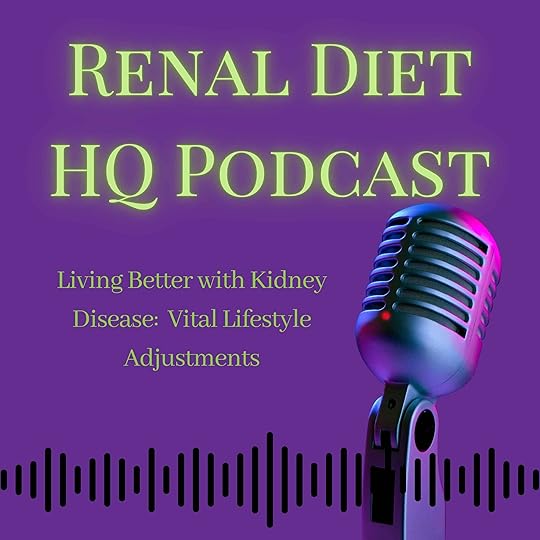
Chronic kidney disease (CKD) is more than just a diagnosis; it signifies a condition that necessitates significant lifestyle adjustments. Living comfortably while maintaining optimal kidney function requires adopting various lifestyle changes. While the prospect of altering one's lifestyle may seem daunting, the adjustments needed for managing CKD are akin to those for maintaining overall health through diet, exercise, and habit management. In this blog post, we will delve into the role of lifestyle changes in managing CKD and improving overall well-being.
Understanding the Role of Diet in CKD ManagementFor More Recipes and Ideas --->> Get Your Free Meals and Recipes That Are Perfect for Pre-Dialysis Diets, Pre-Dialysis with Diabetes, or Dialysis Diets.
The food you consume plays a crucial role in affecting kidney health. Adopting a kidney-friendly dietary regimen can significantly impact CKD progression and improve kidney function. This includes prioritizing foods such as fruits, vegetables, whole grains, and lean proteins while avoiding or limiting high-sodium, high-potassium, and high-phosphorus foods. It's important to work closely with a registered dietitian specializing in CKD to create personalized renal diets tailored to individual needs and preferences.
Implementing dietary modifications is key to managing CKD effectively. Guidelines for CKD patients often include restricting protein intake, controlling sodium intake, and managing potassium and phosphorus levels. It's crucial to follow professional advice on food restrictions and stay vigilant about changes in body weight. Nutritional counseling plays a pivotal role in guiding patients through these dietary modifications, ensuring they receive the essential nutrients while minimizing kidney stress.
Regular physical activity is beneficial for kidney health and overall well-being. Engaging in moderately intense exercise can help regulate blood pressure, control blood sugar levels, and improve mental health. Incorporating activities such as walking, cycling, or resistance training into daily routines can strengthen the heart muscle and positively impact kidney function. It's important to consult with a healthcare provider before starting any new exercise regimen and to gradually increase intensity over time.
Smoking and excessive alcohol consumption can exacerbate kidney damage and increase the risk of developing complications. Quitting smoking and moderating alcohol intake are crucial steps in managing CKD and preventing further kidney damage. Smoking raises blood pressure levels and interferes with the effectiveness of medications used to treat CKD, while excessive alcohol consumption strains the kidneys and can lead to dehydration and other health issues. By quitting smoking and moderating alcohol consumption, CKD patients can significantly improve their kidney health and overall well-being.
Fluid control is essential for managing CKD and preventing complications. CKD patients must monitor their fluid intake, be aware of hidden fluids in foods, and follow professional advice on fluid restrictions. Additionally, medication adherence is paramount in managing CKD effectively. Patients should understand their medications, organize them properly, and communicate any concerns or questions with their healthcare provider. By adhering to prescribed medication regimens and maintaining open communication with healthcare providers, CKD patients can optimize the effectiveness of their treatment.
CKD often coexists with other metabolic conditions such as diabetes and hypertension. Managing these conditions through lifestyle modifications is crucial for improving kidney health and reducing the risk of complications. Lifestyle changes, including dietary modifications, regular exercise, stress management, and medication adherence, play a vital role in managing metabolic conditions and maintaining optimal heart health. By adopting preventive strategies for heart disease and managing metabolic conditions effectively, CKD patients can enhance their overall health and well-being.
Navigating chronic kidney disease requires implementing various lifestyle changes aimed at improving kidney health and overall well-being. By understanding the role of diet, incorporating physical activity, quitting smoking, moderating alcohol consumption, practicing fluid control, adhering to medications, and managing metabolic conditions and heart health, CKD patients can effectively manage their condition and lead healthier lives. It's essential for CKD patients to stay proactive in their management journey and work closely with healthcare providers to optimize their treatment and quality of life.
The post Living Better with Kidney Disease: Vital Lifestyle Adjustments -Podcast appeared first on Renal Diet HQ.
Suggested Reading:
What Is Chronic Kidney DiseaseImprove My Stage of CKDChronic Illness and CKDApril 10, 2024
Myth vs Fact: CKD Symptoms are Always Obvious - Podcast
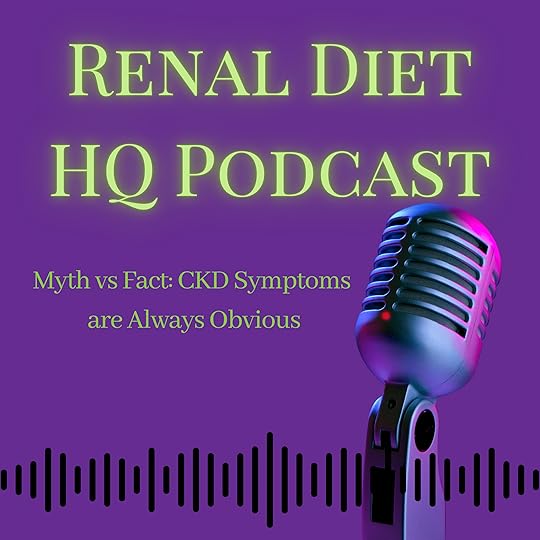
Hi, everyone! Today, we're going to tackle a common myth about chronic kidney disease or CKD. The belief that if you have CKD, you'll definitely know it because of clear symptoms. Let's unpack this, shall we?
Understanding Chronic Kidney Disease (CKD)For More Recipes and Ideas --->> Get Your Free Meals and Recipes That Are Perfect for Pre-Dialysis Diets, Pre-Dialysis with Diabetes, or Dialysis Diets.
CKD is a bit of a sneaky condition. It's often thought that it announces itself with symptoms like kidney pain. But here's the reality: In its early stages, CKD can be quite silent. That's right, CKD often doesn't show its symptoms initially. This is why it's sometimes called a silent disease. The kidneys can be quietly losing their function without sending out any loud signals or pain.
CKD is known for its silent progression. Even though it's a serious condition, it can develop without causing noticeable symptoms. This is why regular testing is crucial, especially for those at risk. Tests like blood tests, urine tests, and blood pressure checks can help detect CKD early on when it's most manageable.
Why is early detection important? Because the sooner you know, the sooner you can take steps to manage it and protect your kidney health. Slowing down the progression of CKD is key, and early intervention is the best way to achieve this. This may involve lifestyle changes, dietary adjustments, and possibly medication. Don't wait for symptoms to take your health seriously—regular checkups are key, especially if you have risk factors like diabetes, hypertension, or a family history of kidney disease.
It's time to take action to protect your kidney health. Regular checkups and proactive monitoring can make all the difference in catching CKD early and managing it effectively. Remember, prevention is better than cure. By staying informed and proactive, you can keep your kidneys healthy and happy for years to come.
Debunking the myth about CKD and its symptoms is essential for raising awareness and promoting early detection. By understanding the silent nature of CKD and the importance of regular testing, individuals can take proactive steps to protect their kidney health. Together, let's erase awareness and support each other in managing CKD. If you found this information helpful, feel free to share it, and don't hesitate to drop a comment below if you have any questions or experiences related to CKD. Here's to keeping our kidneys healthy and happy!
The post Myth vs Fact: CKD Symptoms are Always Obvious - Podcast appeared first on Renal Diet HQ.
Suggested Reading:
What Is Chronic Kidney DiseaseHow Kidney Disease Is DiagnosedChronic Illness and CKDApril 7, 2024
Mother's Day Brunch
Mother's Day is a special occasion dedicated to celebrating and honoring the wonderful women who nurture, support, and inspire us every day. It's a time to express gratitude and love, often marked by heartfelt gestures and shared moments. It can be tough with Chronic Kidney Disease to find the right mix of foods that are healthy and fit into the diet.
Hosting a brunch on this day offers a perfect blend of leisure and festivity, allowing families to gather in a relaxed setting while enjoying delicious food. Whether itâs served in the comfort of home or the charm of a favorite venue, a Motherâs Day brunch provides an opportunity to pause and appreciate mom in a delightful, memorable way, complete with all her favorite dishes.
Fill Out The Form Below To Get A Copy Of The Meals In Your Inbox
Creating a Mother's Day brunch that is both delightful and kidney-friendly requires thoughtful selection of dishes, and this menu does just that, making it a wonderful celebration for those managing chronic kidney disease (CKD).
The Pineapple Salad is a refreshing start, featuring low-potassium pineapple mingled with crisp romaine and cabbage. This dish not only offers a burst of bright flavors but is also light on the kidneys, with a homemade dressing customized to lower sodium contentâa crucial adjustment for CKD patients.
The Strawberry Baked Oatmeal follows as a heartwarming and visually appealing main dish. Oats are a superb choice for a low-phosphorus diet, essential for those with kidney concerns, and when combined with the natural sweetness of strawberries, it results in a dish that's both nutritious and indulgent. This baked oatmeal can be prepared ahead of time, maximizing the day's joy and minimizing kitchen efforts, which is especially beneficial during a festive gathering.
Additionally, the inclusion of Salmon Omelette introduces a high-quality protein source with omega-3 fatty acids, essential for overall health. The combination of salmon, feta, and fresh herbs makes this omelette not only kidney-friendly but also sophisticated and savory, enhancing the brunch spread without compromising dietary needs.
Lastly, the Dairy-Free Cinnamon Rolls offer a sweet finale to the brunch. Tailored for CKD dietary restrictions, these rolls use low-phosphorus and low-potassium ingredients like almond milk and plant-based butter to maintain the joy of indulging in a sweet treat. They ensure that everyone, regardless of their dietary limits, can enjoy a delicious homemade dessert.
Together, these dishes create a Mother's Day brunch that is not only safe and satisfying for those with CKD but also a delightful culinary experience for all guests.
Kidney-Friendly Mother's Day Brunch Pineappl e Salad: This refreshing pineapple salad is the perfect addition to any Mother's Day brunch, offering a burst of bright flavors and a light, health-conscious option. Its blend of romaine, cabbage, and sweet pineapple, topped with a zesty homemade dressing, complements any brunch spread, from pancakes to omelets. Not only delicious, this salad is quick to prepare, allowing you more time to spend with loved ones on this special day. Strawberry Baked Oatmeal : Strawberry Baked Oatmeal is the perfect addition to any Mother's Day brunch, offering a warm, wholesome, and beautifully presented dish that's sure to impress. Its sweet, fruity flavor paired with the comforting texture of baked oats makes it a crowd-pleaser that's both nutritious and delicious. Easy to prepare in advance, it allows you to spend less time in the kitchen and more time celebrating the special day with mom. Salmon Omelette: This salmon omelette is a fantastic addition to a Mother's Day brunch menu because it's both nutritious and delicious, providing a sophisticated yet easy-to-prepare dish that caters to various dietary needs. It's packed with omega-3 fatty acids from the salmon and offers a balanced combination of flavors with the inclusion of feta and fresh herbs. The elegant presentation and light, fluffy texture make it a surefire hit for a celebratory brunch that feels special and thoughtful.Dairy-Free Cinnamon Rolls: This dairy-free cinnamon rolls recipe is an excellent choice for a Mother's Day menu for someone with chronic kidney disease (CKD), as it uses low-phosphorus and low-potassium ingredients like almond milk and plant-based butter, aligning well with CKD dietary restrictions. The substitution of traditional dairy ingredients ensures the rolls remain light and enjoyable while being kidney-friendly. These cinnamon rolls offer a sweet, comforting treat that allows everyone at the table, regardless of dietary needs, to indulge in a special homemade dessert without compromising health.Check Out Our Meal Plans For People With Chronic Kidney Disease (CKD)Recipes For This Mother's Day Brunch MealPineapple Salad
Strawberry Baked Oatmeal
Salmon Omelette
Dairy-Free Cinnamon RollsCheck Out Our Meal Plans For People With Chronic Kidney Disease (CKD)Recent Kidney Friendly Recipes
 Mother's Day Brunch
Mother's Day Brunch Dairy-Free Cinnamon Rolls
Dairy-Free Cinnamon Rolls Salmon Omelette
Salmon Omelette Strawberry Baked Oatmeal
Strawberry Baked OatmealThe post Mother's Day Brunch appeared first on Renal Diet HQ.
Suggested Reading:
What Is Chronic Kidney DiseaseSalmon OmeletteAre Kidney Beans Good for Kidneys?April 5, 2024
From Symptoms to Diagnosis: Navigating Chronic Kidney Disease-Podcast
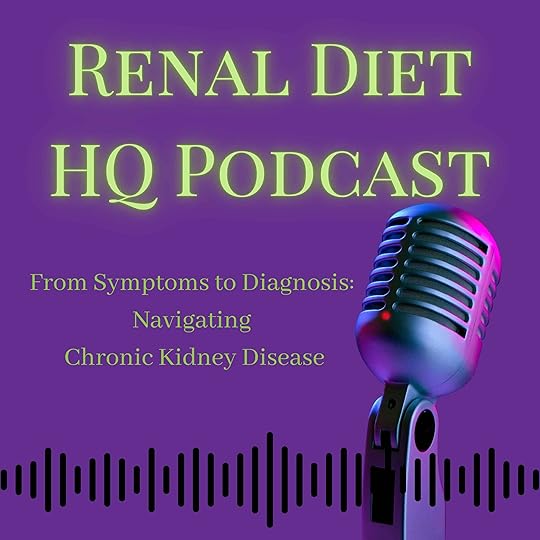
Chronic Kidney Disease (CKD) is a prevalent health condition affecting millions of people worldwide. Despite its common occurrence, many individuals may not be aware of the signs and symptoms until the disease has progressed significantly. In this comprehensive guide, we'll delve into the essential aspects of CKD diagnosis and management, shedding light on key tests, lifestyle factors, and treatment strategies. By understanding CKD better, individuals can take proactive steps towards better kidney health and overall well-being.
Key Tests for Diagnosing CKDFor More Recipes and Ideas --->> Get Your Free Meals and Recipes That Are Perfect for Pre-Dialysis Diets, Pre-Dialysis with Diabetes, or Dialysis Diets.
Diagnosing CKD involves a series of crucial tests aimed at evaluating kidney function and identifying any abnormalities. Among the primary tests used are measurements of albumin and creatinine levels, which provide valuable insights into kidney health. Additionally, ultrasounds and biopsies may be conducted for further examination, helping healthcare providers assess kidney structure and detect any underlying conditions. Early detection through these tests is essential for initiating timely interventions and slowing the progression of CKD.
Introducing the Expert: Registered Dietitian NutritionistAs individuals navigate their CKD journey, the expertise of a registered dietitian nutritionist can be invaluable. Specializing in chronic kidney disease management, these professionals offer personalized guidance on dietary modifications to support kidney health. At RenalDietHQ, we empower individuals to make simple yet delicious changes to their meals, transforming their eating habits and enhancing overall well-being. Together, we embark on a journey towards a healthier, more vibrant life, one bite at a time.
Lifestyle Factors and Risk ReductionSeveral lifestyle factors significantly impact renal health and contribute to the risk of developing CKD. Maintaining a healthy weight, engaging in regular physical activity, and understanding genetic predispositions are essential components of kidney disease prevention. By adopting proactive measures such as sharing family history with healthcare providers and making positive lifestyle changes, individuals can reduce their risk of CKD and promote optimal kidney function.
Role of Family Doctors in CKD Prevention and DiagnosisFamily doctors serve as primary care providers, playing a pivotal role in CKD prevention and diagnosis. Through regular checkups and monitoring of key health indicators such as blood pressure and kidney function, they facilitate early detection and intervention. Collaboration with trusted healthcare providers ensures timely identification of risk factors and implementation of preventive measures, contributing to improved kidney health outcomes.
Routine Testing for CKDRoutine testing forms the cornerstone of CKD management, enabling healthcare providers to monitor kidney function and detect any abnormalities early on. Urine and blood tests, coupled with ultrasound imaging, provide comprehensive insights into kidney health, guiding treatment decisions and interventions. By incorporating regular testing into healthcare routines, individuals can actively engage in their care and promote long-term kidney health.
Kidney Biopsies: Diagnostic Tool for CKDIn cases where further examination is warranted, kidney biopsies play a crucial role in diagnosing CKD. By extracting tiny tissue samples for microscopic examination, healthcare providers can accurately assess kidney function and identify underlying conditions. Kidney biopsies help tailor treatment plans to individual needs, ensuring effective management and improved outcomes for individuals with CKD.
Stages and Diagnosis of CKDCKD diagnosis involves evaluating kidney function, damage, and duration to determine the appropriate stage of the disease. Through a comprehensive approach that includes physical examination, laboratory tests, and imaging studies, healthcare providers establish a definitive diagnosis and initiate targeted interventions. Early diagnosis enables proactive management, slowing disease progression and preserving kidney function.
Treatment Strategies for CKD ManagementManaging CKD requires a multi-faceted approach that addresses underlying causes and complications. From diabetes and hypertension management to immune system regulation and infection treatment, customized treatment plans aim to slow disease progression and improve overall well-being. Collaboration among healthcare providers, including nephrologists, dietitians, and primary care physicians, ensures comprehensive care tailored to individual needs.
Complications and Management of CKDCKD can give rise to various complications, ranging from cardiovascular issues to anemia and electrolyte imbalances. Effective management strategies, including lifestyle modifications, medication adjustments, and psychological support, are essential for minimizing the impact of these complications and enhancing quality of life. Through collaborative care and informed decision-making, individuals can navigate their CKD journey with confidence and resilience.
Understanding the complexities of CKD diagnosis and management is crucial for individuals seeking to optimize their kidney health. By embracing proactive measures, collaborating with healthcare providers, and staying informed about treatment options, individuals can take control of their CKD journey and work towards better outcomes. Together, we can empower individuals to lead healthier, fulfilling lives, free from the constraints of chronic kidney disease.
The post From Symptoms to Diagnosis: Navigating Chronic Kidney Disease-Podcast appeared first on Renal Diet HQ.
Suggested Reading:
What Is Chronic Kidney DiseaseHow Kidney Disease Is DiagnosedChronic Illness and CKDApril 3, 2024
Myth vs Fact: CKD is Always Caused by Diabetes-Podcast
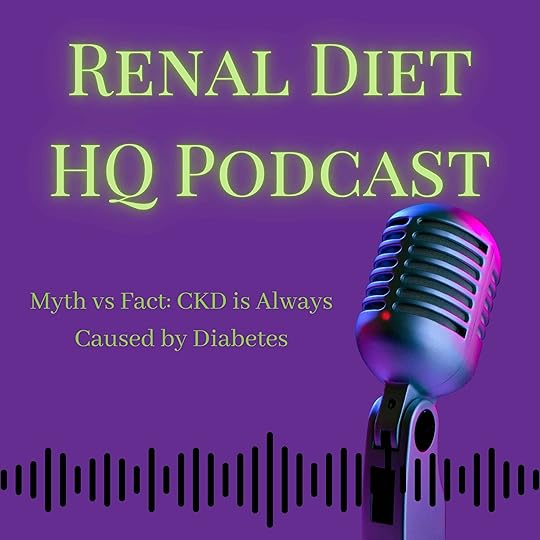
Chronic kidney disease (CKD) is a serious health condition that affects millions of people worldwide. Despite its prevalence, there are several misconceptions surrounding CKD, with one of the most common being the belief that diabetes is the sole cause. In this article, we'll delve into this widespread myth and explore the various factors contributing to CKD, shedding light on the importance of understanding its multifaceted nature.
Dispelling the MythFor More Recipes and Ideas --->> Get Your Free Meals and Recipes That Are Perfect for Pre-Dialysis Diets, Pre-Dialysis with Diabetes, or Dialysis Diets.
The notion that diabetes is the leading cause of CKD is deeply ingrained in popular belief. While it's true that diabetes can significantly contribute to CKD, it's essential to recognize that it's not the only culprit. CKD stems from a variety of factors, and diabetes is just one piece of the puzzle.
Other Culprits of CKDOne major factor besides diabetes is hypertension, commonly known as high blood pressure. Much like putting too much pressure on a hose can lead to damage over time, hypertension can exert strain on the kidneys, eventually causing CKD. This analogy illustrates the gradual deterioration of kidney function due to prolonged high blood pressure.
Additional CausesBeyond diabetes and hypertension, CKD can arise from various other sources. Certain infections can compromise kidney health, while inherited disorders like Polycystic Kidney Disease (PKD) pose significant risks. Additionally, prolonged use of certain medications, such as ibuprofen, can also impact kidney function over time.
Implications for Maintaining HealthUnderstanding the multifaceted nature of CKD underscores the importance of maintaining overall health. Whether you have diabetes, high blood pressure, or any related conditions, prioritizing your well-being is crucial in preventing CKD. Regular checkups, effective management of blood pressure, and awareness of family health history are vital steps in safeguarding kidney health.
Debunking the myth that diabetes is the sole cause of CKD is essential in raising awareness about this complex condition. By recognizing the various factors contributing to CKD, we can empower individuals to take proactive steps in preserving kidney function. Let's spread the word and encourage early detection and prevention efforts to combat CKD effectively.
Take charge of your health by scheduling regular checkups and staying informed about CKD risk factors. If you have any questions or experiences related to CKD, feel free to share them in the comments below. Together, let's prioritize kidney health and work towards a healthier future.
The post Myth vs Fact: CKD is Always Caused by Diabetes-Podcast appeared first on Renal Diet HQ.
Suggested Reading:
What Is Chronic Kidney DiseaseChronic Illness and CKDHow to Control Blood Pressure in CKD PatientsMarch 29, 2024
Navigating Daily Life with Chronic Kidney Disease: An Inside Look-Podcast
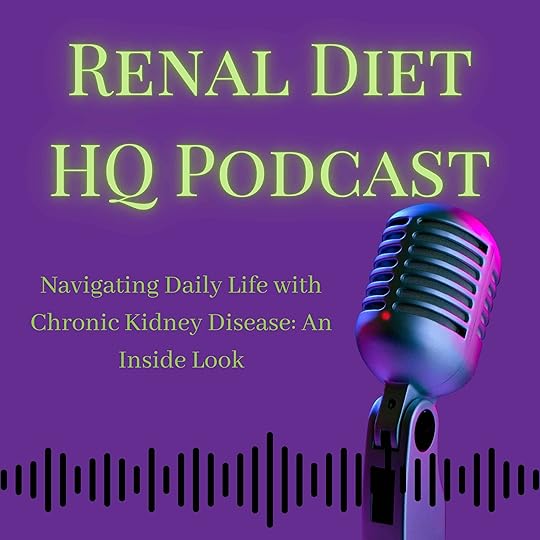
Living with kidney disease presents a unique set of challenges, impacting not just physical health but also emotional well-being. Receiving a chronic health diagnosis, such as kidney disease, is more than just learning the name of an illness; it's akin to being handed a life sentence. Suddenly, daily life is significantly altered, and the diagnosis can feel overwhelming. However, effective management of kidney disease is within reach, encompassing both physical and emotional aspects.
Understanding the Impact of Kidney DiseaseFor More Recipes and Ideas --->> Get Your Free Meals and Recipes That Are Perfect for Pre-Dialysis Diets, Pre-Dialysis with Diabetes, or Dialysis Diets.
Kidney disease isn't just about physical symptoms; it also affects mental health. Feelings of anxiety, depression, and stress can accompany the diagnosis, making it essential to manage these emotions effectively to ensure they don't hinder treatment progress. Recognizing the significance of kidney disease and its impact on daily life is the first step towards effective management.
Empowering Management StrategiesTaking control of kidney disease involves empowering yourself with knowledge and making necessary lifestyle changes. Seeking guidance from healthcare professionals, including registered dietitian nutritionists specializing in kidney disease, can help adapt to new routines and improve overall quality of life. Simple yet impactful dietary adjustments can play a crucial role in managing the condition.
Recognizing Symptoms and Seeking Support
Early detection of kidney disease is key to preventing progression and managing symptoms effectively. Regular checkups with healthcare providers are vital for monitoring kidney function and addressing any emerging issues. Additionally, seeking support from loved ones and joining support groups can provide invaluable emotional comfort and practical advice.
Making lifestyle changes, including modifying diet and incorporating regular exercise, is essential for managing kidney disease. Understanding dietary restrictions and adhering to recommended meal plans can help alleviate strain on the kidneys and improve overall health. Every healthy choice counts towards managing the condition better and enhancing overall well-being.
Prioritizing Emotional Well-beingMaintaining mental health is just as crucial as physical health when living with kidney disease. Coping mechanisms such as mindfulness exercises and building a strong support network can help manage stress, anxiety, and depression associated with the diagnosis. Prioritizing emotional well-being enables individuals to navigate the challenges of kidney disease with resilience and positivity.
Maintaining Regular Health MonitoringRegular medical tests and monitoring are essential for tracking kidney function and disease progression. Understanding lab values and interpreting test results in collaboration with healthcare providers is crucial for informed decision-making. By staying proactive in managing the condition and adhering to treatment plans, individuals can safeguard against further deterioration of kidney health.
Adhering to Treatment PlansMedication adherence and following prescribed treatments, including dialysis or kidney transplant if necessary, are vital components of managing kidney disease. Lifestyle choices, such as maintaining a balanced diet and avoiding harmful habits, complement medical interventions and support overall disease prevention. Building a strong support system further enhances resilience during the treatment journey.
Finding Balance and SupportFinding balance in daily life while managing kidney disease is essential for maintaining quality of life. Support networks, including family, friends, and patient groups, offer emotional comfort and practical assistance. While kidney disease may present challenges, it doesn't define one's potential for joy and fulfillment. By navigating the journey with confidence and positivity, individuals can effectively manage their condition and prioritize their health.
Living with kidney disease requires a holistic approach that addresses both physical and emotional well-being. By understanding the impact of the condition, empowering oneself with knowledge, and implementing lifestyle changes, individuals can take control of their health and navigate the journey with resilience. Prioritizing emotional well-being, maintaining regular health monitoring, and adhering to treatment plans are crucial steps towards effectively managing kidney disease and improving overall quality of life.
As you embark on your journey of managing kidney disease, remember that you are not alone. Seek support from healthcare professionals, loved ones, and online communities to navigate the challenges with confidence. By prioritizing your health and well-being, you can embrace life's joys and challenges with resilience and optimism. Stay informed, stay proactive, and take control of your health journey.
The post Navigating Daily Life with Chronic Kidney Disease: An Inside Look-Podcast appeared first on Renal Diet HQ.
Suggested Reading:
What Is Chronic Kidney DiseaseEarly Stage Kidney DiseaseHow Kidney Disease Is DiagnosedMarch 27, 2024
Myth vs Fact: Your Diet Doesn't Affect CKD -Podcast
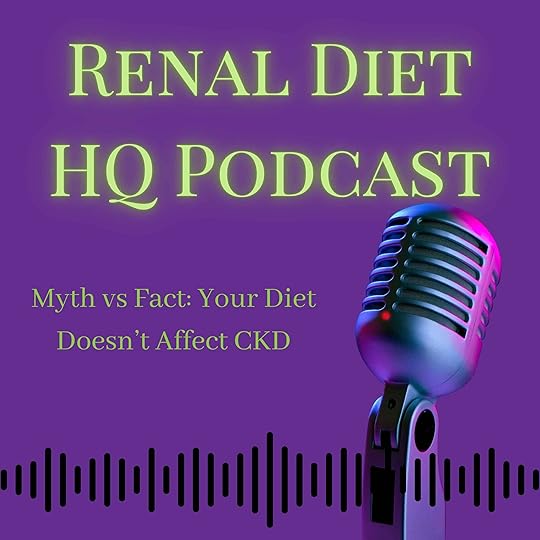
Chronic kidney disease (CKD) is a condition that affects millions worldwide, yet misconceptions about its management persist. One prevalent myth is the notion that dietary choices have little influence on CKD progression. Today, we'll debunk this myth and explore the crucial role that diet plays in managing CKD effectively.
Debunking the MythUnderstanding CKD and its Relationship with DietFor More Recipes and Ideas --->> Get Your Free Meals and Recipes That Are Perfect for Pre-Dialysis Diets, Pre-Dialysis with Diabetes, or Dialysis Diets.
CKD fundamentally alters kidney function, making dietary considerations vital. Contrary to the belief that diet lacks significance in CKD, it profoundly affects its progression. As a dietitian specializing in kidney health, I firmly oppose this myth.
Importance of Proper Nutrition in CKD ManagementProper nutrition can significantly slow CKD progression and enhance overall health. Managing nutrient intake, such as protein, sodium, potassium, and phosphorus, is pivotal, especially considering the stage of CKD.
The Reality of Diet and CKDSodium and Blood Pressure ManagementReducing sodium intake is key to managing blood pressure, a critical aspect of kidney health. By moderating sodium intake, individuals can positively impact their CKD management and overall well-being.
Protein Intake and Kidney WorkloadBalancing protein intake is crucial in alleviating the kidneys' workload. By being mindful of protein consumption, individuals can lessen the strain on their kidneys, thus slowing CKD progression.
Tailoring Diet Plans for Individual NeedsPersonalized diet plans, tailored to individual CKD stages and health conditions, are essential. Dietitians specializing in kidney health are invaluable resources in crafting effective dietary strategies for managing CKD.
Empowering Individuals Through KnowledgeSeeking guidance from healthcare professionals, particularly dietitians specializing in kidney health, empowers individuals in managing CKD effectively. Sharing knowledge and experiences fosters a supportive community dedicated to promoting better kidney health.
The myth that diet has minimal impact on CKD progression is debunked. As highlighted, dietary choices significantly influence CKD management and overall well-being. I invite you to share your questions and insights on diet and CKD in the comments below, fostering a collaborative dialogue towards better kidney health for all.
The post Myth vs Fact: Your Diet Doesn't Affect CKD -Podcast appeared first on Renal Diet HQ.
Suggested Reading:
What Is Chronic Kidney DiseaseDiabetic Renal Diet Meal PlanCKD Diet GuidelinesMarch 22, 2024
Processed Foods To Avoid With Chronic Kidney Disease (CKD) | Nutrition Guide-Podcast
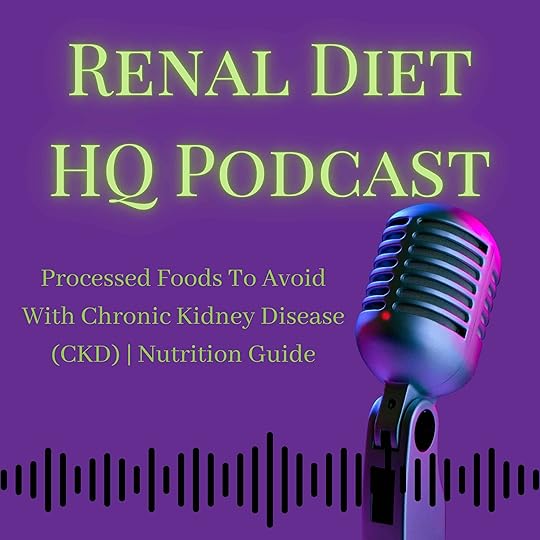
In the United States, processed foods dominate the dietary landscape, often overshadowing healthier whole food options in grocery stores. While processed foods may offer convenience and affordability, their consumption poses significant risks to health, particularly for individuals living with chronic conditions like kidney disease. In this comprehensive guide, we'll delve into the effects of processed foods on kidney health, identify harmful ingredients to avoid, and explore healthier alternatives to support overall well-being.
About the AuthorFor More Recipes and Ideas --->> Get Your Free Meals and Recipes That Are Perfect for Pre-Dialysis Diets, Pre-Dialysis with Diabetes, or Dialysis Diets.
Hello, I'm Mathea Ford, a registered dietitian nutritionist specializing in chronic kidney disease and the founder of RenalDietHQ.com. With a focus on empowering individuals to make delicious yet healthful changes to their meals, I've dedicated myself to helping people improve their health and well-being through dietary modifications tailored specifically to their needs.
Processed foods encompass a wide range of products that have undergone various forms of alteration from their original state. While some processing methods are harmless, such as washing or chopping fresh produce, others involve chemical additives and alterations that can be detrimental to health. Chemically processed foods often contain additives like preservatives, colorants, and sweeteners, which can have adverse effects on the body, especially for individuals with kidney disease.
The consumption of processed foods poses significant health risks for individuals with kidney disease. These foods are typically high in sodium, sugar, and phosphorus, all of which can exacerbate existing conditions and contribute to kidney damage. Excessive sodium intake, commonly found in processed foods, can lead to hypertension and fluid retention, placing added strain on the kidneys. Moreover, phosphorus additives in processed meats can further compromise kidney function, highlighting the importance of avoiding such products.
When navigating the aisles of grocery stores, it's essential to be vigilant about identifying and avoiding processed foods. Reading ingredient labels is key to uncovering hidden additives and chemicals. Opting for whole, unprocessed foods like fresh fruits, vegetables, and whole grains can significantly improve health outcomes for individuals with kidney disease. By embracing a diet rich in real, nutrient-dense foods, one can reduce the risk of exacerbating kidney-related complications.
High sodium content is a prevalent issue in processed foods and can have dire consequences for kidney health. Excessive sodium intake can lead to fluid retention, elevated blood pressure, and cardiovascular problems, all of which can further damage the kidneys. To mitigate these risks, it's essential to choose low-sodium alternatives and prioritize fresh, homemade meals over processed options. By carefully monitoring sodium intake and opting for whole foods, individuals with kidney disease can better manage their health.
Processed meats often contain phosphorus additives, which can adversely affect kidney function. These additives are used to enhance texture, extend shelf life, and improve flavor but can exacerbate existing kidney-related complications. To reduce phosphorus intake, individuals with kidney disease are encouraged to opt for lean protein alternatives like fresh poultry, fish, and plant-based sources. By making informed dietary choices, one can support kidney health and overall well-being.
While dried fruits are often touted as a healthy snack option, they can pose challenges for individuals with kidney disease due to their high potassium content. Excessive potassium intake can disrupt mineral balance in the body and exacerbate kidney-related complications. To manage potassium levels, it's essential to choose lower-potassium fruits and practice portion control. By incorporating kidney-friendly alternatives into one's diet, individuals can support optimal kidney function and overall health.
Enjoying sweet treats can still be a part of a kidney-friendly diet with the right alternatives. Carob chips, vanilla-flavored desserts, and fruit-based treats offer delicious options with lower phosphorus and potassium content. By indulging in moderation and consulting with a registered dietitian, individuals can satisfy their sweet cravings while prioritizing kidney health.
The impact of processed foods on kidney health cannot be overstated. By understanding the risks associated with processed foods and making informed dietary choices, individuals with kidney disease can better manage their condition and improve overall well-being. Remember, consultation with a registered dietitian is essential for personalized dietary guidance and support on the journey to optimal kidney health. Let's prioritize health and well-being by embracing whole, nutrient-dense foods and avoiding processed options. Your kidneys will thank you for it.
The post Processed Foods To Avoid With Chronic Kidney Disease (CKD) | Nutrition Guide-Podcast appeared first on Renal Diet HQ.
Suggested Reading:
Processed Foods To Avoid With Chronic Kidney DiseaseWhat Is Chronic Kidney DiseaseFoods To Avoid With Kidney Disease


